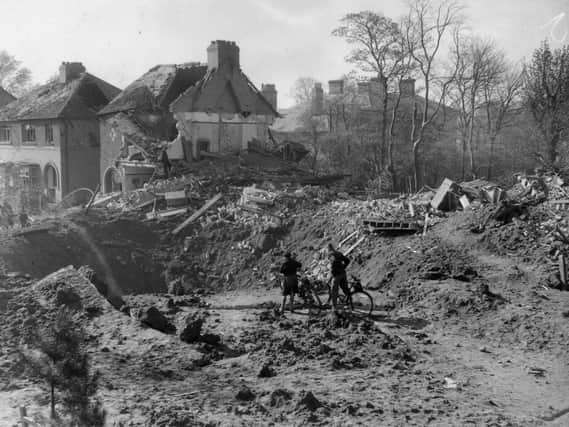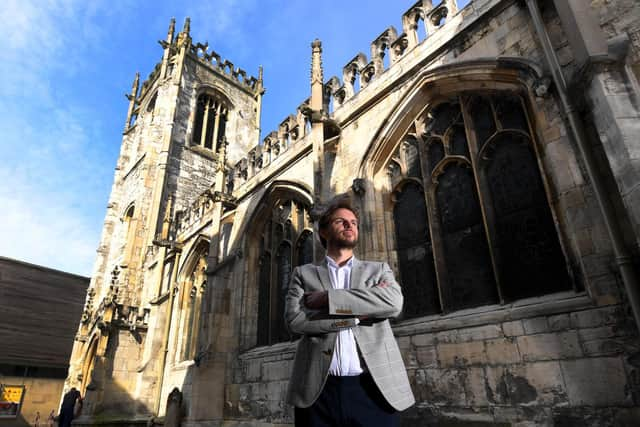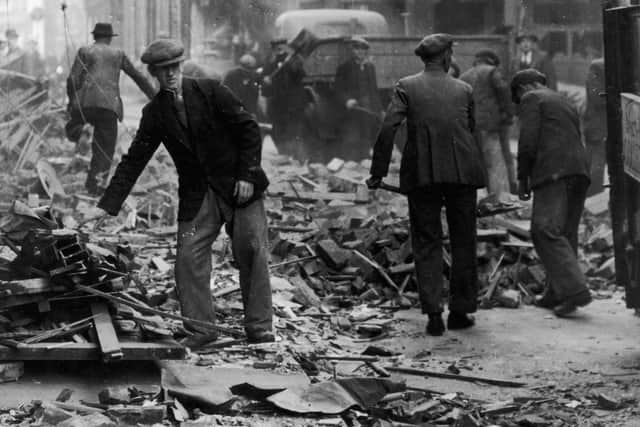Remembering the terror of Second World War air raids on York 80 years on


As many as 43,000 civilians were killed and another 139,000 were wounded during the Blitz, as Adolf Hitler ordered repeated waves of air strikes in an attempt to bomb Britain into submission.
Today (August 11), a new heritage project is being launched in a Yorkshire city which faced more than two years of bombing raids.
Advertisement
Hide AdAdvertisement
Hide AdMarking the date the first bomb dropped in York – hitting the cemetery in 1940 – the Raids Over York initiative will look at how residents and authorities prepared for and coped with the bombing.


There were 10 individual targeted raids on York, between that first bomb on August 11 1940 and the last raid on September 24, 1942.
While the largest and most deadly of these was the Baedeker Raid, which took place on April 28-29, 1942 and killed 79, bombs fell far beyond the city centre throughout the campaign, causing chaos and terror across York’s suburbs.
The project will use the 80th anniversaries of the raids over the next two years, to relive details of each one in ‘real time’ on its social media channels. And with eyewitness accounts, as well as archive material from sources including The Yorkshire Post, there is a wealth of information available.
Advertisement
Hide AdAdvertisement
Hide AdLocal historian Nick Beilby has been involved in the project.


He said: “People have contacted us with their knowledge of concrete air-raid shelters in Heworth, bomb craters in Clifton Backies, dispersal pens on Clifton Moor, which was then known as RAF Clifton, and scarring from shrapnel damage to properties across the city.”
He said personal reminiscences have been collected and the project emphasises how the war affected a “lost generation” of York’s children and young adults.
Their memories give a fascinating insight into events, including the delight of an Acomb schoolboy who turned a street corner to discover Poppleton Road School had been bombed overnight and his summer holidays had come early.
Advertisement
Hide AdAdvertisement
Hide AdAnother story highlights a young mother who went into labour during a raid before arriving at a local Methodist Chapel shelter with her new-born baby.
The Raids Over York project has involved organisations such as the York Civic Trust, the University of York, the Explore York library service, Yorkshire Architectural and York Archaeological Society and the York Oral History Society.
Duncan Marks, who is a member of the York Civic Trust, said the experiences during the Second World War was a “city-wide story” which affected all sections of society.
He said: “We hope the project encourages people to get out and about and explore forgotten Second World War heritage.
Advertisement
Hide AdAdvertisement
Hide Ad“During the Covid-19 lockdown period, people have found great comfort in better discovering their local environment, including its heritage, and we hope they will engage with the stories of the 10 raids as they are celebrated over the next two years.”
The Raids Over York project will run for the next two years with a varied programme of events.
Organisers will be holding walking trails, introducing commemorative plaques and staging public exhibitions.
The city’s Second World War heritage will also be marked through an interactive digital map which will show the location of bomb craters, shelters and sites which have been associated with people’s memories of the raids.
Advertisement
Hide AdAdvertisement
Hide AdThe digital map is expected to be rolled out later in the year.
Information on upcoming events, people’s recollections and other events which will be staged is available on the project’s official website at www.raidsoveryork.co.uk.
-----------------------
Editor’s note: first and foremost - and rarely have I written down these words with more sincerity - I hope this finds you well.
Almost certainly you are here because you value the quality and the integrity of the journalism produced by The Yorkshire Post’s journalists - almost all of which live alongside you in Yorkshire, spending the wages they earn with Yorkshire businesses - who last year took this title to the industry watchdog’s Most Trusted Newspaper in Britain accolade.
Advertisement
Hide AdAdvertisement
Hide AdAnd that is why I must make an urgent request of you: as advertising revenue declines, your support becomes evermore crucial to the maintenance of the journalistic standards expected of The Yorkshire Post. If you can, safely, please buy a paper or take up a subscription. We want to continue to make you proud of Yorkshire’s National Newspaper but we are going to need your help.
Postal subscription copies can be ordered by calling 0330 4030066 or by emailing [email protected]. Vouchers, to be exchanged at retail sales outlets - our newsagents need you, too - can be subscribed to by contacting subscriptions on 0330 1235950 or by visiting www.localsubsplus.co.uk where you should select The Yorkshire Post from the list of titles available.
If you want to help right now, download our tablet app from the App / Play Stores. Every contribution you make helps to provide this county with the best regional journalism in the country.
Sincerely. Thank you.
James Mitchinson
Editor
Comment Guidelines
National World encourages reader discussion on our stories. User feedback, insights and back-and-forth exchanges add a rich layer of context to reporting. Please review our Community Guidelines before commenting.